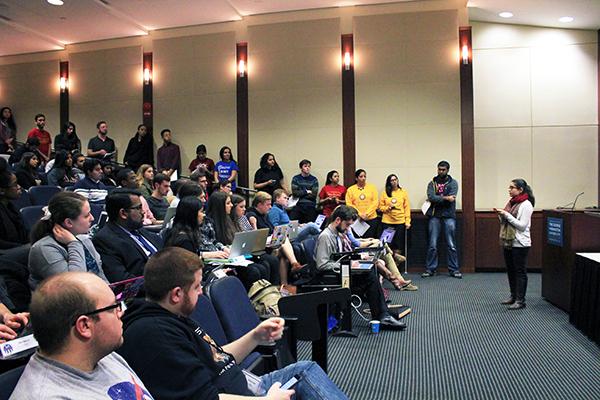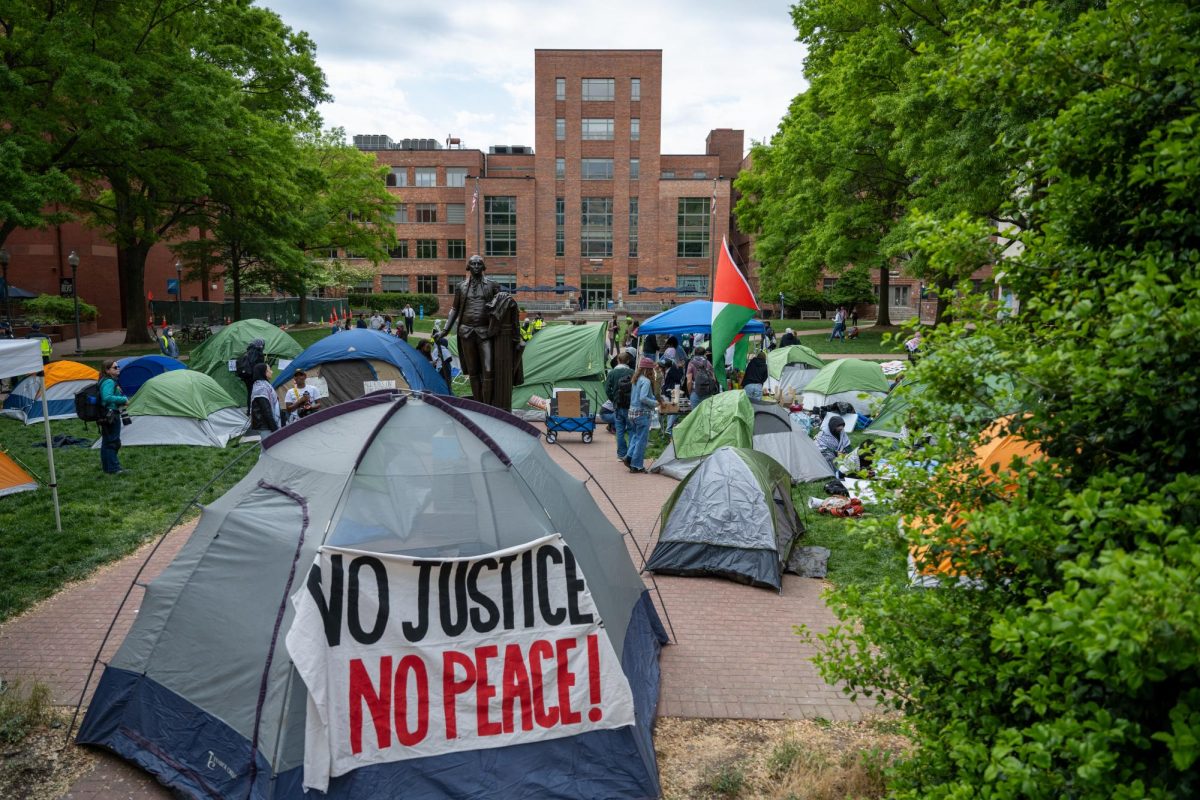Updated: Feb. 28, 2016 at 2:37 p.m.
Student Association members will go through required diversity training following last week’s outcry about the funding of an ethnic heritage celebration.
The decision to mandate diversity training for the executive cabinet later this year comes after members of the SA’s finance committee denied multiple requests to sponsor a South Asian Heritage Celebration keynote speaker. Student groups also called for a formal apology after they said some finance committee members made insensitive comments in a meeting about funding the event.
More than 100 members of multicultural student organizations and groups like the Progressive Student Union and Allied in Pride packed the Marvin Center amphitheater last Monday night to condemn the denied funding and comments. About two dozen students expressed their frustration and voiced grievances during public comment at the meeting, including multiple senators.
In the Feb. 17 finance committee where organizers of the South Asian Heritage Celebration requested the funding, Sen. Paden Gallagher, the chair of the finance committee, “went on a rant” about funding the speaker, according the meeting minutes that were obtained by The Hatchet. The minutes did not include direct quotes, but summarized the conversations at the meeting.
Other members of the finance committee said in the Feb. 3 and Feb. 17 meetings that South Asian Heritage Celebration organizers seemed unprepared during their presentations and that the speaker, “The Daily Show” correspondent Hasan Minhaj, was not a big enough name to warrant a large allocation.
Gallagher said in an email that the finance committee passed a request to transfer funds from the engineering group to the Hindu Students Association last week.
“I think we’ve had some really constructive conversations about what happened,” he said in an email.
The SA had planned to vote at its Feb. 22 meeting to allocate about $9,300 to the American Society of Civil Engineers, an amount that nearly tripled after Sen. Brandon Bernier, SEAS-G, said the engineering group would pay for Minhaj to perform after the finance committee declined three requests to bring the comedian to campus.
“After having worked closely with ASCE, I trusted that they would help us get the money where it needed to go,” he said in an email.
SA President Andie Dowd said members of the SA “learned a lot” from the incident.
Dowd said she and Michael Tapscott, the director of the Multicultural Student Services Center, have exchanged emails to pick a day for the diversity and inclusion training, but no details about what the training will look like have been released. Dowd said she would like to add a similar training for the senate in the future.
“We can all do a better job of respecting every student on this campus and hearing their concerns and how we can help and advocate for them. And that’s something that I really want to focus on, is that every student matters, every student organization matters,” Dowd said.
Last year, the president of the Young America’s Foundation resisted a package of SA bills to add mandatory training sessions about LGBT issues for student leaders and faculty, requesting a religious exemption.
The senate will vote on a resolution to formally support the South Asian Heritage Celebration at its next meeting, according to its agenda. Earlier this year, the senate approved similar legislation about the Latino Heritage Celebration after extensive debate.
Each of the three candidates for SA president posted statements on social media denouncing the finance committee and pledging to support multicultural student organizations’ initiatives.
Roughly 10 percent of undergraduate students are Asian, according to GW’s Office of Institutional Research and Planning. About 6 percent are black and 8 percent are Hispanic.
Students affiliated with South Asian organizations said they were disappointed but not surprised by the comments made and the decision not to fund the speaker. They said the most tangible way for the SA to support multicultural organizations is to increase funding for groups, as well as mandate that senators attend multicultural heritage events.
Senior Yumna Rizvi, the political director for the Pakistani Students Association, said she was “angry and taken aback” when she heard about the comments made in the finance committee meeting.
“The SA really needs to make more of an effort to understand the multicultural community on campus – and that doesn’t just mean when it’s election season ‒ to come around with their pitches about inclusion and funding,” she said.
Rayhaan Rasheed, the vice president of the South Asian fraternity Iota Nu Delta, said pushback from the SA felt “disheartening.”
“I came to GW not to say, ‘I’m a South Asian,’ but to say, ‘I’m a student here.’ We all go to the same classes and live in the same dorms,” Rasheed said.
Rasheed, a sophomore, said many students in the South Asian community are the first in their families to attend college and that their parents are often immigrants. Rasheed said as the South Asian community tries to establish a prominent presence on campus, bringing keynote speakers like Minaj – whose parents emigrated from India – is an important way to share different perspectives.
The annual South Asian Heritage Celebration month first began four years ago. The Center for Student Engagement started holding office hours once a week for first-generation students this year and hosting monthly dinners for the group earlier this year. A record number of first-generation students applied to GW this year, the University announced this month.
Officials have been searching for a new administrator to oversee counseling for minority students since October. Vice Provost for Diversity and Inclusion Terri Harris Reed, who was tasked with creating a more inclusive environment on campus, resigned earlier this year to take a job at a historically black college.
Junior Devan Cole, the membership and events coordinator of the Black Student Union, said the new diversity and inclusion training could help ease the added burden minority students sometimes feel at GW.
He said remarks like those made at the finance committee meetings may seem minor, but they negatively affect students of color who could spend time working toward their personal goals, academic or otherwise, instead of tackling discrimination.
“You don’t have time to deal with remarks like this,” he said.
Cole, who is a candidate for senator in next month’s SA election, said the hours-long debate at the SA meeting was “indicative of the ignorance that exists” on not just the senate, but on college campuses in general.
He said he hopes next year, the senate is a more diverse body and the mandatory training helps to educate senators about the experiences of others “to work with them on a level that’s respectful.”
“I think it’s been made clear a lot of senators aren’t here for multicultural students. It shouldn’t take an incident like that to show that we need diversity and inclusion training,” he said.
Crystel Sylvester, James Levinson and Sera Royal contributed reporting.
This post was updated to reflect the following correction:
The Hatchet incorrectly reported that members of the SA senate will undergo diversity training. The training will be for members of the executive cabinet of the Student Association. We regret this error.








